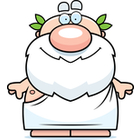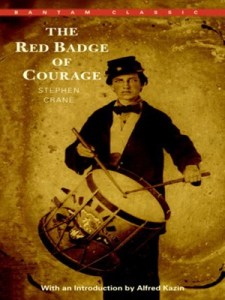The Red Badge of Courage tells the story of a Civil War battle—or series of battles and skirmishes—from the perspective of raw recruit Henry Fleming. Published in 1895, it is a classic of American literature, praised for its realistic depiction of war (rare for its time, and especially impressive given that author Stephen Crane was in his early 20s and had zero experience of war or military life).
The book is as much a psychological study of Fleming—or of the kind of common soldier he was intended to represent—as anything. Throughout the book we’re taken inside his mind as he experiences fear and guilt, rationalizes, assesses his comrades, weighs his options, etc.
What I appreciate most about the book—and what makes me think it is indeed highly realistic—is how utterly chaotic its combat is, and how little is known of the big picture by ordinary soldiers. They don’t know where they’re marching or why, whether their side is winning or losing a battle, the size of the force opposing them, etc. They’re largely out of control of their circumstances and of their fate, mostly reduced to responding to stimuli in an immediate, instinctive way.
They also don’t seem to know or care why the war is being fought. Nowadays perhaps war propaganda is more sophisticated or more ubiquitous, because seemingly every soldier knows what they’re fighting for. (They’re fighting for [the soldier’s country]’s freedom, and because if they didn’t fight “We’d all be speaking [the enemy country of the soldier’s language].” Not to mention they’re fighting because God favors [their country] in this war, as [the enemy country] represents unjust aggression and everything evil that must be defeated.)
Was that not true of the Civil War? Or is Crane willing to bend the truth in order to make his soldiers as generic as possible so that their attitudes and experiences can be generalized to any war?
Fleming is fighting for the North, but I’m surprised Crane reveals even that much, since what side he’s on has no bearing whatsoever on how he experiences war.
Fleming is a farm boy. He is not drafted, but voluntarily enlists. Not because he agrees with the cause the military is fighting for—as I say, any such cause isn’t even mentioned—but for vague reasons having more to do with craving the sort of rite of passage that makes one an adult, and, relatedly, a desire to defy the authority of his mother. The battle depicted in the book is the first action he has seen.
Much of his cogitation throughout the book has to do with running away from the danger of combat. He speculates whether he will do so, whether doing so would be right or wrong, and what the consequences might be. Then after he does in fact run away at the first opportunity, he goes back and forth over whether he should feel guilty or whether his behavior was justified prudence, and he worries a great deal over whether other people will realize he ran away and how they will treat him if they do, and what he’ll have to do or what lies he’ll have to tell to prevent their finding out he ran away.
At times he is horrified when he comes face to face with death—staring with fascination and terror at corpses, noting such things as that:
The corpse was dressed in a uniform that once had been blue, but was now faded to a melancholy green. The eyes, staring at the youth, had changed to the dull hue to be seen on the side of a dead fish. The mouth was open. Its red had changed to an appalling yellow. Over the gray skin of the face ran little ants. One was trundling some sort of a bundle along the upper lip.
Other times a field strewn with the dead and dying becomes just the normal background of the activity he’s engaged in, and he barely notices it.
In time he is much better able to behave in conventionally brave ways on the battlefield, as he and his now more experienced cohorts learn to go into a frenzied daze and lose themselves in the collective.
The whole time reading The Red Badge of Courage, and thinking about how we’re taught our whole lives to venerate soldiers, and to regard as the epitome of courage and selflessness this ability that Fleming acquires over the course of the book to overcome the natural tendency toward self-preservation in order to become a more obedient and efficient killer of strangers, my mind kept going back to Thoreau’s Civil Disobedience:
A common and natural result of an undue respect for law is, that you may see a file of soldiers, colonel, captain, corporal, privates, powder-monkeys, and all, marching in admirable order over hill and dale to the wars, against their wills, ay, against their common sense and consciences, which makes it very steep marching indeed, and produces a palpitation of the heart. They have no doubt that it is a damnable business in which they are concerned; they are all peaceably inclined. Now, what are they? Men at all? or small movable forts and magazines, at the service of some unscrupulous man in power?…The mass of men serve the state thus, not as men mainly, but as machines, with their bodies. They are the standing army, and the militia, jailers, constables, posse comitatus, etc. In most cases there is no free exercise whatever of the judgment or of the moral sense; but they put themselves on a level with wood and earth and stones; and wooden men can perhaps be manufactured that will serve the purpose as well. Such command no more respect than men of straw or a lump of dirt. They have the same sort of worth only as horses and dogs. Yet such as these even are commonly esteemed good citizens.

